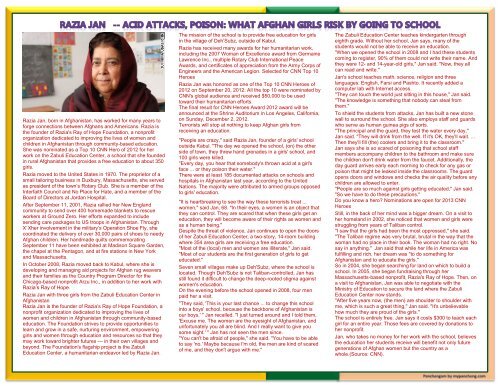Women's Education 2013 Hindu Calendar - myPanchang.com
Women's Education 2013 Hindu Calendar - myPanchang.com
Women's Education 2013 Hindu Calendar - myPanchang.com
- No tags were found...
You also want an ePaper? Increase the reach of your titles
YUMPU automatically turns print PDFs into web optimized ePapers that Google loves.
Razia Jan, born in Afghanistan, has worked for many years toforge connections between Afghans and Americans. Razia isthe founder of Razia's Ray of Hope Foundation, a nonprofitorganization dedicated to improving the lives of women andchildren in Afghanistan through <strong>com</strong>munity-based education.She was nominated as a Top 10 CNN Hero of 2012 for herwork on the Zabuli <strong>Education</strong> Center, a school that she foundedin rural Afghanistan that provides a free education to about 350girls.Razia moved to the United States in 1970. The proprietor of asmall tailoring business in Duxbury, Massachusetts, she servedas president of the town’s Rotary Club. She is a member of theInterfaith Council and No Place for Hate, and a member of theBoard of Directors at Jordan Hospital.After September 11, 2001, Razia rallied her New England<strong>com</strong>munity to send over 400 homemade blankets to rescueworkers at Ground Zero. Her efforts expanded to includesending care packages to US troops in Afghanistan. ThroughX`Xher involvement in the military’s Operation Shoe Fly, shecoordinated the delivery of over 30,000 pairs of shoes to needyAfghan children. Her handmade quilts <strong>com</strong>memoratingSeptember 11 have been exhibited at Madison Square Garden,the chapel at the Pentagon, and at fire stations in New Yorkand Massachusetts.In October 2008, Razia moved back to Kabul, where she isdeveloping and managing aid projects for Afghan rug weaversand their families as the Country Program Director for theChicago-based nonprofit Arzu Inc., in addition to her work withRazia’s Ray of Hope.Razia Jan with three girls from the Zabuli <strong>Education</strong> Center inAfghanistanRazia Jan is the founder of Razia’s Ray of Hope Foundation, anonprofit organization dedicated to improving the lives ofwomen and children in Afghanistan through <strong>com</strong>munity-basededucation. The Foundation strives to provide opportunities tolearn and grow in a safe, nurturing environment, empoweringgirls and women through education and resources so that theymay work toward brighter futures — in their own villages andbeyond. The Foundation's flagship project is the Zabuli<strong>Education</strong> Center, a humanitarian endeavor led by Razia Jan.The mission of the school is to provide free education for girlsin the village of Deh’Subz, outside of Kabul.Razia has received many awards for her humanitarian work,including the 2007 Woman of Excellence award from GermaineLawrence Inc., multiple Rotary Club International PeaceAwards, and certificates of appreciation from the Army Corps ofEngineers and the American Legion. Selected for CNN Top 10HeroesRazia Jan was honored as one of the Top 10 CNN Heroes of2012 on September 20, 2012. All the top 10 were nominated byCNN's global audience and received $50,000 to be usedtoward their humanitarian efforts.The final result for CNN Heroes Award 2012 award will beannounced at the Shrine Auditorium in Los Angeles, California,on Sunday, December 2, 2012.Terrorists will stop at nothing to keep Afghan girls fromreceiving an education."People are crazy," said Razia Jan, founder of a girls' schooloutside Kabul. "The day we opened the school, (on) the otherside of town, they threw hand grenades in a girls' school, and100 girls were killed."Every day, you hear that somebody's thrown acid at a girl'sface ... or they poison their water."There were at least 185 documented attacks on schools andhospitals in Afghanistan last year, according to the UnitedNations. The majority were attributed to armed groups opposedto girls' education."It is heartbreaking to see the way these terrorists treat ...women," said Jan, 68. "In their eyes, a women is an object thatthey can control. They are scared that when these girls get aneducation, they will be<strong>com</strong>e aware of their rights as women andas a human being."Despite the threat of violence, Jan continues to open the doorsof her Zabuli <strong>Education</strong> Center, a two-story, 14-room buildingwhere 354 area girls are receiving a free education."Most of the (local) men and women are illiterate," Jan said."Most of our students are the first generation of girls to geteducated."Seven small villages make up Deh'Subz, where the school islocated. Though Deh'Subz is not Taliban-controlled, Jan hasstill found it difficult to change the deep-rooted stigma againstwomen's education.On the evening before the school opened in 2008, four menpaid her a visit."They said, 'This is your last chance ... to change this schoolinto a boys' school, because the backbone of Afghanistan isour boys,' " Jan recalled. "I just turned around and I told them,'Excuse me. The women are the eyesight of Afghanistan, andunfortunately you all are blind. And I really want to give yousome sight.' " Jan has not seen the men since."You can't be afraid of people," she said. "You have to be ableto say 'no.' Maybe because I'm old, the men are kind of scaredof me, and they don't argue with me."The Zabuli <strong>Education</strong> Center teaches kindergarten througheighth grade. Without her school, Jan says, many of thestudents would not be able to receive an education."When we opened the school in 2008 and I had these students<strong>com</strong>ing to register, 90% of them could not write their name. Andthey were 12- and 14-year-old girls," Jan said. "Now, they allcan read and write."Jan's school teaches math, science, religion and threelanguages: English, Farsi and Pashto. It recently added a<strong>com</strong>puter lab with Internet access."They can touch the world just sitting in this house," Jan said."The knowledge is something that nobody can steal fromthem."To shield the students from attacks, Jan has built a new stonewall to surround the school. She also employs staff and guardswho serve as human guinea pigs of sorts."The principal and the guard, they test the water every day,"Jan said. "They will drink from the well. If it's OK, they'll wait. ...Then they'll fill (the) coolers and bring it to the classroom."Jan says she is so scared of poisoning that school staffmembers ac<strong>com</strong>pany children to the bathroom and make surethe children don't drink water from the faucet. Additionally, theday guard arrives early each morning to check for any gas orpoison that might be leaked inside the classrooms. The guardopens doors and windows and checks the air quality before anychildren are allowed to enter."People are so much against girls getting educated," Jan said."So we have to do these precautions."Do you know a hero? Nominations are open for <strong>2013</strong> CNNHeroesStill, in the back of her mind was a bigger dream. On a visit toher homeland in 2002, she noticed that women and girls werestruggling from years of Taliban control."I saw that the girls had been the most oppressed," she said."The Taliban regime was very brutal, brutal in the way that thewoman had no place in their book. The woman had no right. Nosay in anything." Jan said that while her life in America wasfulfilling and rich, her dream was "to do something forAfghanistan and to educate the girls."So in 2004, she began searching for land on which to build aschool. In 2005, she began fundraising through herMassachusetts-based nonprofit, Razia's Ray of Hope. Then, ona visit to Afghanistan, Jan was able to negotiate with theMinistry of <strong>Education</strong> to secure the land where the Zabuli<strong>Education</strong> Center now stands."After five years now, (the men) are shoulder to shoulder withme, which is such a great thing," Jan said. "It's unbelievablehow much they are proud of the girls."The school is entirely free. Jan says it costs $300 to teach eachgirl for an entire year. Those fees are covered by donations toher nonprofit.Jan, who takes no money for her work with the school, believesthe education her students receive will benefit not only futuregenerations of Afghan women but the country as awhole.(Source: CNN).
















